 Petzlover
Petzlover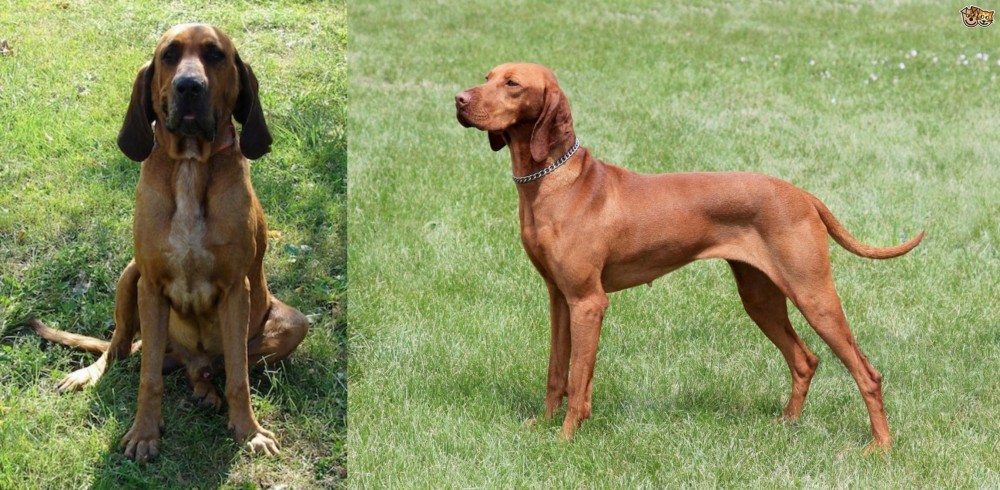 Majestic Tree Hound is originated from United States but Hungarian Vizsla is originated from Hungary. Majestic Tree Hound may grow 12 cm / 5 inches higher than Hungarian Vizsla. Majestic Tree Hound may weigh 20 kg / 45 pounds more than Hungarian Vizsla. Majestic Tree Hound may live 3 years more than Hungarian Vizsla. Both Majestic Tree Hound and Hungarian Vizsla has almost same litter size. Both Majestic Tree Hound and Hungarian Vizsla requires Low Maintenance.
Majestic Tree Hound is originated from United States but Hungarian Vizsla is originated from Hungary. Majestic Tree Hound may grow 12 cm / 5 inches higher than Hungarian Vizsla. Majestic Tree Hound may weigh 20 kg / 45 pounds more than Hungarian Vizsla. Majestic Tree Hound may live 3 years more than Hungarian Vizsla. Both Majestic Tree Hound and Hungarian Vizsla has almost same litter size. Both Majestic Tree Hound and Hungarian Vizsla requires Low Maintenance.
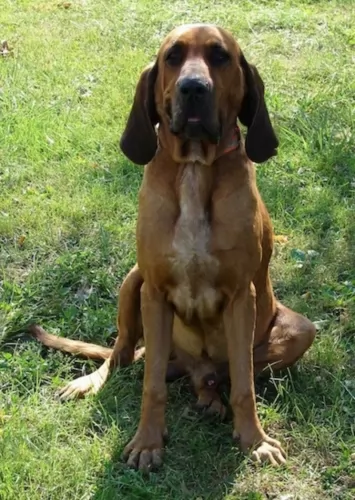 The Majestic Tree Hound is a fairly new crossbreed dog. While the actual breed is very recent, the stem stock goes way back to medieval times.
The Majestic Tree Hound is a fairly new crossbreed dog. While the actual breed is very recent, the stem stock goes way back to medieval times.
The dog’s heritage goes back to the St. Hubert Hound named after Francois Hubert. He bred the best scenting hounds in Southern France.
In fact when France experienced political unrest that resulted in emigration to the United States, they brought their dogs, among them hound dogs which were then crossed with other dogs. Bloodhounds, English Foxhounds, American Coon and Big Game Hounds have all contributed to the Majestic Tree Hound after a long time of breeding to bring forth a hound that had sharp scenting abilities as well as a balanced temperament.
The origin of the Majestic Tree Hound is the United States.
Today they are not seen much outside the United States. The first Majestic's were registered with the National Kennel Club in April 1980.
 The Hungarian Vizslas existed in the land that is now Hungary, the Pannonian Basin, at least since the 10th century when they were shown on etchings. It is thought that their descendants were various pointers, the extinct Turkish Yellow Dog and the Transylvanian Hound. The Vizsla is a hunting dog with the word being Hungarian for pointer. In 1937 the Carmelite Friars under orders from King Louis I of Hungry. The breed was isolated for centuries in the Basin by the aristocracy and land owners.
The Hungarian Vizslas existed in the land that is now Hungary, the Pannonian Basin, at least since the 10th century when they were shown on etchings. It is thought that their descendants were various pointers, the extinct Turkish Yellow Dog and the Transylvanian Hound. The Vizsla is a hunting dog with the word being Hungarian for pointer. In 1937 the Carmelite Friars under orders from King Louis I of Hungry. The breed was isolated for centuries in the Basin by the aristocracy and land owners.
The Magyar people of the area developed the breed for hunting as both pointers and retrievers. They were excellent at hunting rabbits and water fowl. With a terrific sense of smell and boundless stamina and energy, the were prized as family and companion dogs as well. This was unusual for a hunting or working dog. Their size made them appealing as well. They were small by comparison to other hunting dogs both pointers and retrievers.
Easy to train, the Hungarian Vizsla works in water, forests and fields. They are able to retrieve in the water as well as on the land. Throughout their history, the breed outlasted the Turkish Revolution, the Hungarian Revolution World War 1 and World War 2, as well as the Hungarian People’s Republic Communist State. Things were a little dicey for the Vizlas several times beginning in the 1800’s when German Shorthaired Pointers and English Pointers were introduced into the area. The next time was after World War II. Fearful of what this Communist state would mean for the breed, some were smuggled into the United States and Austria.
At that time there were only a dozen or so Vizslas in all of Hungary. Their numbers were brought back from that small breeding stock. This history did result in several different strains grew into their own breeding stock. There are Vizslas in Czechoslovakia, Romania, Serbia and Austria. There developed separate lines that became separate breeds in the Wirehaired Vizsla and the longhaired Vizsla which is very rare.
After World War II, the Hungarian Vizsla came to the United States and the Vizsla Club of American was established as a first step toward AKC (American Kennel Club) recognition. This was attained in 1960. Rex del Geisimino came to the U.S. in 1951 and he was able to respond to commands in both German and Hungarian. Vizslas also came to the United Kingdom in this time frame. There are now about 4500 registered with the KC (Kennel Club of Great Britain). A Vizsla won the distinctive Crufts Dog Show in Great Britain, as Best in Show.
It is believed that this gentle, sensitive and affectionate hunter was part of the original breeding stock or the Wirehaired Vizsla, the Weimaraner and the German Shorthaired Pointers. The Hungarian Vizsla is intelligent and social. The need your attention as well as a lot of exercise to avoid destructive behavior born of boredom. They want to be with you and they can be very protective of you.
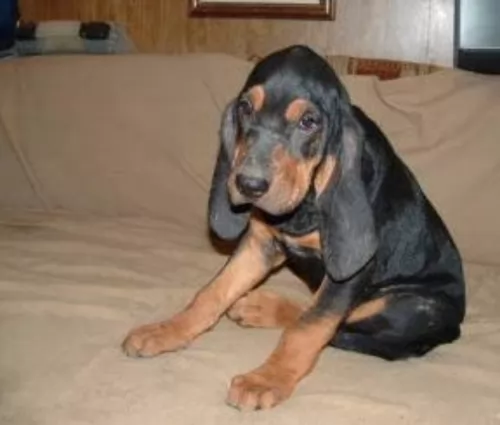 The Majestic Treehound is a large sized working dog. This dog is a cross between the Bloodhound and the Black and Tan Coonhound. Both male and female stand at roughly 61-76 cm in height and weighs in at about 33 – 50kg.
The Majestic Treehound is a large sized working dog. This dog is a cross between the Bloodhound and the Black and Tan Coonhound. Both male and female stand at roughly 61-76 cm in height and weighs in at about 33 – 50kg.
If you want your dog to become a parent, you can expect between 2 to 6 of the cutest puppies.
The coat is smooth, short and dense and comes in a number of colors such as black, black and tan grey and white as well as red and blue ticking.
The dog has sunken brown or yellow eyes, particularly long, floppy ears, a deep chest and a long tail. The tail is set high and is thick at the base and is essentially carried in accordance with the dog’s mood. The tail is never carried over the back. There was a time when the tail of the Majestic was docked, giving him an attractive, compact look. They are powerfully built dogs with a dignified look to them.
The Majestic Treehound has always been a most fearless and adept hunter and he is a dog that just loves being busy. They are also loyal and devoted companions for their human families.
He is a huge dog but he is gentle, good natured and kind with children and is also willing to get on well with pets in the home. You won’t find him being much of a guard dog though because he is just too friendly for this.
He is a dog that is going to need regular exercise, and his sheer size and exercise requirements will make it that he is better off living in the countryside than in the city.
He is an intelligent dog who will be easy to train. Training and socialization will be good for him as he knows exactly how to behave in different situations. He doesn’t want to be left on his own for too long because he bonds closely with his owners and wants to be around them constantly.
 The Hungarian Vizsla has a light build, a short coat, and a distinctive bearing. They are medium in size and muscular, lean dogs looking a lot like the Weimaraner. They are also close in appearance to the Rhodesian Ridgeback and the Redbone Coonhounds. They are more muscular and leaner than the Rhodesian Ridgeback and Weimaraner.
The Hungarian Vizsla has a light build, a short coat, and a distinctive bearing. They are medium in size and muscular, lean dogs looking a lot like the Weimaraner. They are also close in appearance to the Rhodesian Ridgeback and the Redbone Coonhounds. They are more muscular and leaner than the Rhodesian Ridgeback and Weimaraner.
The Vizsla has a reddish nose and their nails and eyes should also be reddish or blending with the color of their coat. They have docked tails in the American standard but not in the United Kingdom, as docking is banned there. If he has a tail, you can see it flying through the air as he runs through the rough land to retrieve fowl.
They have a domed skull with a tapered muzzle that is shorter or equal to the skull. They have eyes that are contrasted with the coat and of medium size. The ears of silky, hang close to the face and the tips are rounded. The coat is rust in color with many shades. He also has a deep chest and hound like face.
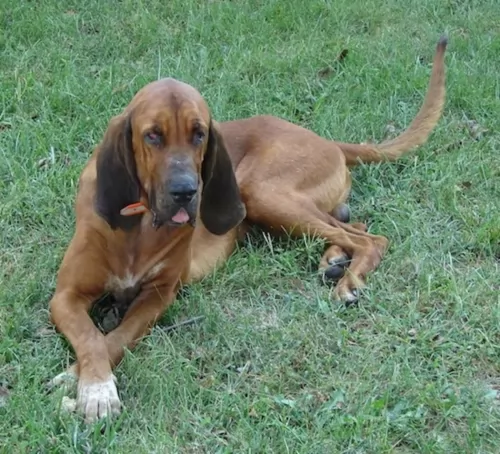 This large attractive dog has a gentle nature and is loving and affectionate towards his human family, getting on well with children and other pets in the family.
This large attractive dog has a gentle nature and is loving and affectionate towards his human family, getting on well with children and other pets in the family.
As with most little dogs, this big dog doesn’t like to be left alone for a long time. With training and socialization he becomes obedient and amicable, knowing how to behave well so that he can be taken anywhere.
Treat this loving dog with love and care and he is guaranteed to make you a splendid family pet.
 Children friendliness - The Vizsla is very good with children.
Children friendliness - The Vizsla is very good with children.
Special talents - They are both excellent pointers and retrievers.
Adaptability - They are not very adaptable in living arrangements as they are much more suited for the country than the city.
Learning ability – The Vizsla is a very intelligent breed and easy to train. His learning ability is very high.
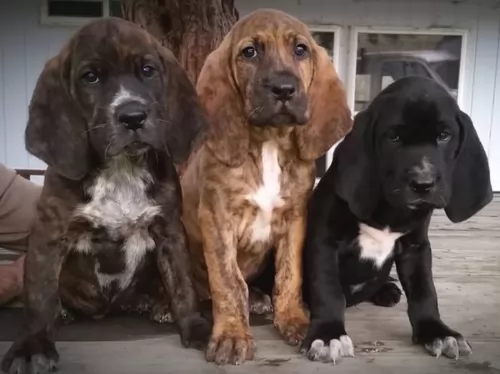 The Majestic is a robust breed, and with good food and exercise he can live to be between 10 and 13 years of age.
The Majestic is a robust breed, and with good food and exercise he can live to be between 10 and 13 years of age.
It has been discovered that like many other dogs, he can battle with hip dysplasia. Large dogs are more prone to hip dysplasia. It is an abnormal formation of the hip socket. It’s a serious condition that can cause arthritis and lameness.
Hip dysplasia often begins when a dog is still a puppy. One of the symptoms is difficulty with getting up after lying down, pain in hip joints and even loss of muscle mass. You will need to get your pet to the vet. The vet will perform a complete physical exam on your dog and then talk to you about treatment.
 The Hungarian Vizsla has a series of health issues that include:
The Hungarian Vizsla has a series of health issues that include:
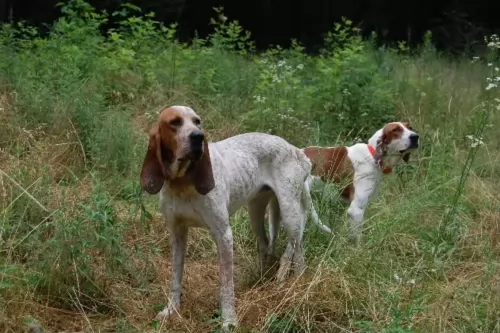 Occasional brushing, perhaps twice a week, will be enough to maintain this dog’s short coat. The long ears tend to drag on the ground, collecting dirt and moisture, and the ears particularly will need to be washed or wiped down and checked inside for infection.
Occasional brushing, perhaps twice a week, will be enough to maintain this dog’s short coat. The long ears tend to drag on the ground, collecting dirt and moisture, and the ears particularly will need to be washed or wiped down and checked inside for infection.
This is a dog with high exercise requirements. A walk a day for him is a good thing but it won’t be enough – he will need some rough and tumble games and want to join you on hikes, swimming and jogs.
Majestic Tree Hounds require nutritious food. If you want to use commercially manufactured food, make sure its the better one as some of the cheaper brands put fillers, preservatives and colorants in and this can cause a whole lot of damage for your dog.
Buy quality food for your pet. The idea is to keep things simple for your big dog so that he doesn’t succumb to digestive problems. Apart from top quality kibble, homemade food will be excellent for him. Boiled chicken cooked in some coconut oil with some brown rice and pasta and some cooked or raw vegetables will be delicious for your dog. You can add it to his dry kibble. Remember to ensure he always has cool, fresh water.
 Feed two to four cups per day of a high quality dry dog food. Break this up into three or four meals. Don’t free feed your puppy.
Feed two to four cups per day of a high quality dry dog food. Break this up into three or four meals. Don’t free feed your puppy.
Feed two to three cups per day of high quality dry dog food. Feed in two servings.
The Vizsla is an athlete with high energy.
The Hungarian Vizsla needs at least 30 minutes of exercise every day and maybe more. He needs a large yard or open field, but daily brisk walks will do if that is all that is possible. He needs to be stimulated intellectually as well and enjoys fetch, jogging with you, lure coursing, field trials, tracking and scent work, confirmation, agility, barn hunt, dock diving, rally, and obedience.